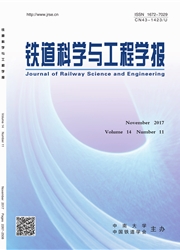

 中文摘要:
中文摘要:
通过算例计算和比较分析,在选择合理的定量化交通网络效率计算方法的基础上,建立面向网络效率的交通网络设计双层规划模型,并基于遗传算法和Frank-Wolfe算法设计模型的求解方法。计算分析结果表明:相对于传统的以系统总阻抗最小为目标的优化决策方案,本文所提出的以网络效率最优为目标的优化方案,更注重于提高当前交通网络基础设施的利用率和流量分布的均衡性,从而能以最小的投入在最大程度上缓解交通网络拥堵,并能高效解决路段车流分布不均及个别路段的过饱和等矛盾。
 英文摘要:
英文摘要:
Based on the choice of the reasonable quantitative evaluation method for the transportation network efficiency with numerical example calculation and comparative analysis, this paper established a bi-level programming model for solving the transportation network design problem based on the network efficiency.Based on genetic algorithm and Frank-Wolfe algorithm, the method for solving the model was designed. The numerical example results show that, comparing with the optimization scheme with the objective of minimizing the system total impedance, the transportation network optimization scheme with the objective of maximizing network efficiency pays more attention to improve the current transportation network infrastructure utilization rates and guarantees the flow distribution in equilibrium. Therefore, this method can alleviate transportation network congestion with a smaller investment, and solve unbalanced distribution problems of road traffic flow and supersaturated problems of specific links efficiently.
 同期刊论文项目
同期刊论文项目
 同项目期刊论文
同项目期刊论文
 Multi-commodity flow and multi-period equilibrium model of supply chain network with postponement st
Multi-commodity flow and multi-period equilibrium model of supply chain network with postponement st 期刊信息
期刊信息
